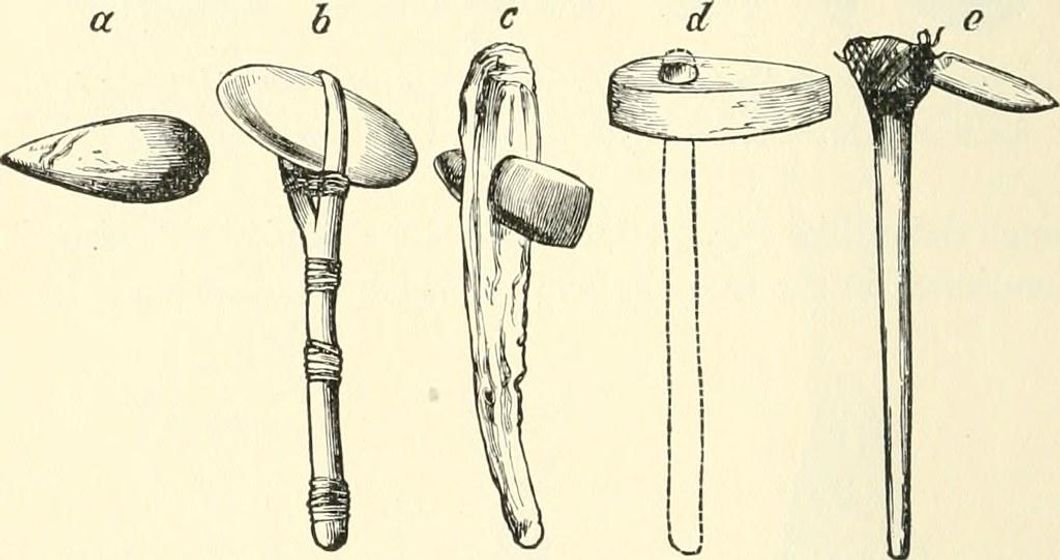Anthropology
An·thro·pol·o·gy
From the Greek ánthrōpos, "human" and lógos, "study"
noun
- the study of human societies and cultures and their development.
- the study of human biological and physiological characteristics and their evolution.
In short, the most interdisciplinary college major in existence.
Growing up, I was sort of a "jack of all passions". I liked and indulged in everything from science to history, music to math, and from reading to art. Like most children, I would ask questions like "who invented math?" Perhaps less like most children, that question would lead me on an endless thread of researching connections to that simple question: reading about the middle eastern market, Arabic culture, and Arabic numbers would result.
Likewise with science or anything really, I would not just settle for an answer, I sought explanations and connections not just about the answers, but the people who found them and their culture. I do not just want to know that the Chinese invented fireworks, I want to know about the festivals they were used in, how the invention changed society, how did it evolve, how it affected trade, were women allowed to make or designate them, etc.
Anthropology is the field of many passions. For starters, there are four main sectors of Anthropology: Archeology, Biological Anthropology, Cultural Anthropology, and Linguistics.
However, even these four diverse types have subcategories that encompass more than you'd imagine.
- Archeology. Although it's a part of Anthropology, it's diverse within itself. Using scientific techniques and knowledge of things like climate and environment, Archeologist carefully excavate areas to unearth the past. It's exciting to peer into a tomb untouched for millennia or maybe field a piece of a calendar that leads us to know more about a culture's farming habits. Within archeology, there are biblical, environmental, cultural, classical, and many other studies.
- Biological Anthropology. Anything from how illnesses are shaped to osteology performed on remains from a site. It's such an amazing catch to combine history and hands-on science.
- Cultural Anthropology. Often, this is the most famous. Also, some of anthropology's largest modern name comes from this subfield. Zora Neal Hurston, author of Their Eyes Were Watching God and Ann Dunham, mother of Barack Obama and author of The Effects of Industrialization on Women Workers in Indonesia. Culture is everywhere. Schools, workplaces, and even other career pathways all have a culture to them. All of them can be studied and anthropology does just that.
- Linguistics. Language is such an important part of a culture. The shift in how you text your friend and how you email your professor represents a shift in the culture of the relationship you carry with both of them. On a larger scale, it can expose values, gender roles, and regional differences.
Archeology
Archeology is essentially the scientific excavation of land to find out more about history. It is probably one of the most well-known subfields. Everyone has heard of King Tut of Egypt, one of the most revolutionary finds in archeological history. Discoveries can reveal incredible things like ancient trade routines, customs, cities, and people that were not as well known yet did something pivotal in history. This can change our world view on relations of cultures, engineering (how were the pyramids built?), medicine, literature, and every other aspect of human life and origins.
Biological Anthropology
 Giphy
GiphyIn summary, this sub-discipline studies the behavioral and physical aspects of humans. Yes, this includes knowing the mandible, clavicle, vertebrae, and everything else you'd learn in an anatomy class. Why? When archeologist find human remains, someone needs to be able to do an examination on the remains. What ethnicity are they? Judging by the pelvic area, are these remains of a male or female?
This is definitely an approach that's more in line with what people generally think of with science; all in all, it's an interesting spin on an interest in biology.
Cultural Anthropology
Cultural anthropologist study the cultural variations and practices between humans. Within a culture, people study things such as politics, religion, marriage patterns, kinship systems, economics, and social organization. They also can choose to study ancient or modern cultures, as well as the change over time from ancient to modern of some cultures.
Continuing, many cultural anthropologists live under the social rules and conditions alongside the cultures they want to study to get a more accurate understanding. This could be an anthropologist living with the Masai people in Kenya today or living with a modern Native American group in an attempt to understand their ancestors. Also, many cultural anthropologists study minorities and their interaction and navigation in an area where the predominant culture is not their own.
Linguistics
 Giphy
GiphyLinguistics is the study of human communication. In addition to languages and how they're connected, many linguists also study non-verbal communication. There are many famous languages that have clicks ( such as the Xhosa language in Africa ) and others that communicate using whistles ( like the Sfyria language on the Greek island of Evia ). Also, much of the English language derives from Latin.
In total, if you're looking for an interesting minor, or perhaps a major, anthropology and it's many subfields and divisions have something that could amplify your interests. For a "jack of all passions" like myself, Anthropology's many inter-disciplines are perfect for learning just a wee bit of everything- before specializing, of course.











